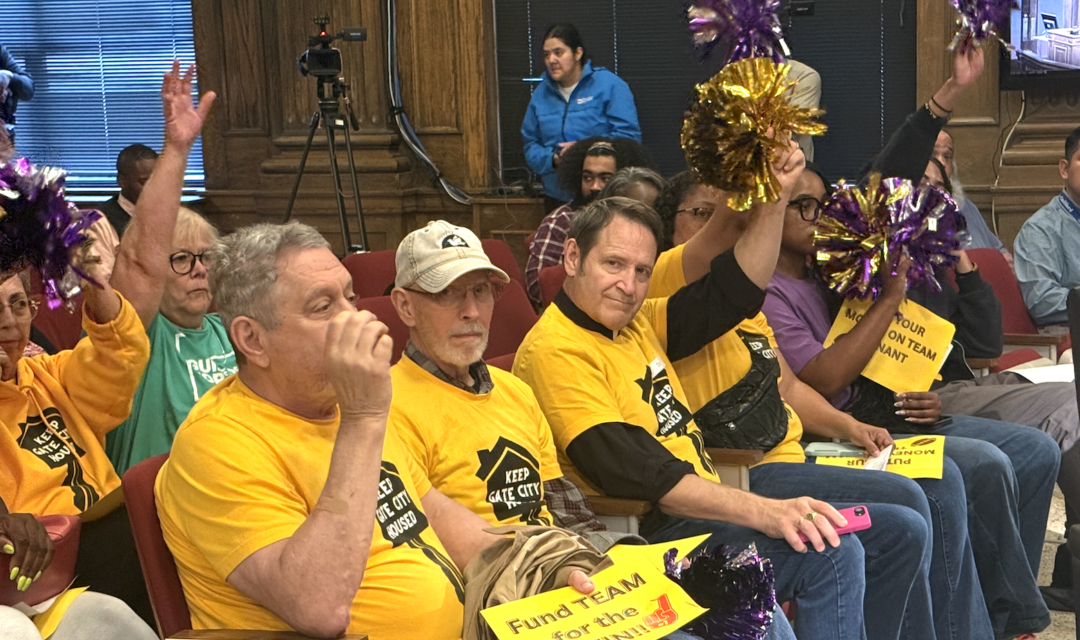At a packed budget public hearing on Thursday, June 5, the Guilford County Board of Commissioners heard from more than 30 speakers who offered input on the proposed 2025-2026 budget presented by County Manager Mike Halford. The majority of speakers focused on the need for increased funding for Guilford County Schools; however, another group, Keep Gate City Housed, was also there in force with a sizable and vocal presence in the commissioners meeting room in the Old Guilford County Court House in downtown Greensboro.
Keep Gate City Housed is asking the county to allocate nearly $850,000 in the upcoming budget to extend services the group currently offers to residents facing eviction. The initiative was formed in 2024 in collaboration with the American Friends Service Committee North Carolina and has been funded through the end of December 2025 using federal American Rescue Plan Act funds. The additional money the group is seeking would allow the organization to continue operations through the end of the fiscal year on June 30, 2026.
The audience included a large contingent of Keep Gate City Housed supporters, many of whom waved pom-poms in support after each speaker from the group addressed the commissioners.
A woman who works with the UNC-Greensboro Center for Housing and Community Studies explained that her team has seen over 3,000 clients, offering mediation services to help people avoid court proceedings and resolve landlord-tenant disputes.
“Our program is about mediation,” she said. “We target help to people to avoid going to court. We have reached out to landlords so we can let them know the center is available for an attorney to come and resolve the issue.”
She noted that clients have ranged from homeowners with housing repair issues to people who are already homeless. She also emphasized the center’s efforts to maintain and update a weekly list of available affordable housing options.
A man named Terrell, an organizer and tenant, spoke very enthusiastically in support of the funding.
“Our big piece right now has been educating tenants – upstream planning and problem solving,” he said. “We’ve been able to identify more properties in our affordable housing portfolio and help tenants being retaliated against in their evictions.”
Terrell called on the commissioners to act with foresight.
An attorney from Legal Aid of North Carolina, who’s been working with the project, said Guilford County’s support has been essential to maintaining a presence in eviction court. “We recently expanded to be there four days a week, which is all the days that court is in session in Greensboro,” she said. “Without continued county funding, we cannot continue that level of service. Every day we see the difference this is making in people’s lives.”
Another speaker, a local criminal defense attorney, said the eviction crisis in the area is connected to broader social issues.
“So many of my clients have had unstable housing situations,” he told the commissioners. “They get evicted and end up in areas plagued by gun violence. Their kids are displaced from schools. It’s all connected.”
The speaker told the board that a county budget is more than just numbers on a page. He said it’s something much loftier.
“Our budget is a moral document of what a community values,” he said. “By supporting housing stability, we can reduce crime and poverty and give kids a real chance.”
Several speakers pointed out that the eviction crisis affects all age groups – and everyone from college students to veterans to families with children.
One supporter told the board, “This is not about leading – this is about us. It’s about the people you drive past every single day.”
She urged the commissioners to understand the real-world consequences of letting the program lapse.
Another attorney described a rare moment in court that day when the judge had to call a recess during eviction proceedings.
“That’s how impactful the tenant support team has become,” she said. “If that gentleman had court on a day we weren’t funded to be there, he might never have been connected to services. When someone ends up homeless, it costs the county a lot more than supporting us in court to explain their rights.”
Keep Gate City Housed formed in May 2024 as a grassroots effort to change how evictions are handled in Guilford County. The group has worked with City of Greensboro and Guilford County staff – as well as with service providers and volunteers – to expand access to legal resources and rental assistance in the county.
Everyone knows Guilford County has a bad homeless problem and the group’s mission is based on stark local numbers: About 16,000 Guilford County residents received eviction notices last year, however, only 10 percent had legal representation –compared to 90 percent of landlords.
Speakers cited examples from other cities. Louisville spends $400,000 annually on eviction prevention in anticipation of cost savings. Cleveland invests more than $3 million each year on legal and rental aid programs.
In Guilford County, the TEAM (Tenant Education and Advocacy Movement) project– run through Legal Aid and UNCG – has helped 30 percent of represented tenants avoid eviction.
While it remains to be seen whether the commissioners will fund the request – it is an extremely tight budget this year – the group made a clear and coordinated push, and made the argument that the cost of inaction is higher than the price of prevention.
That could sway some commissioners to offer the group more funding.
As one speaker pleaded, “This is about making sure there’s someone there to help.”

